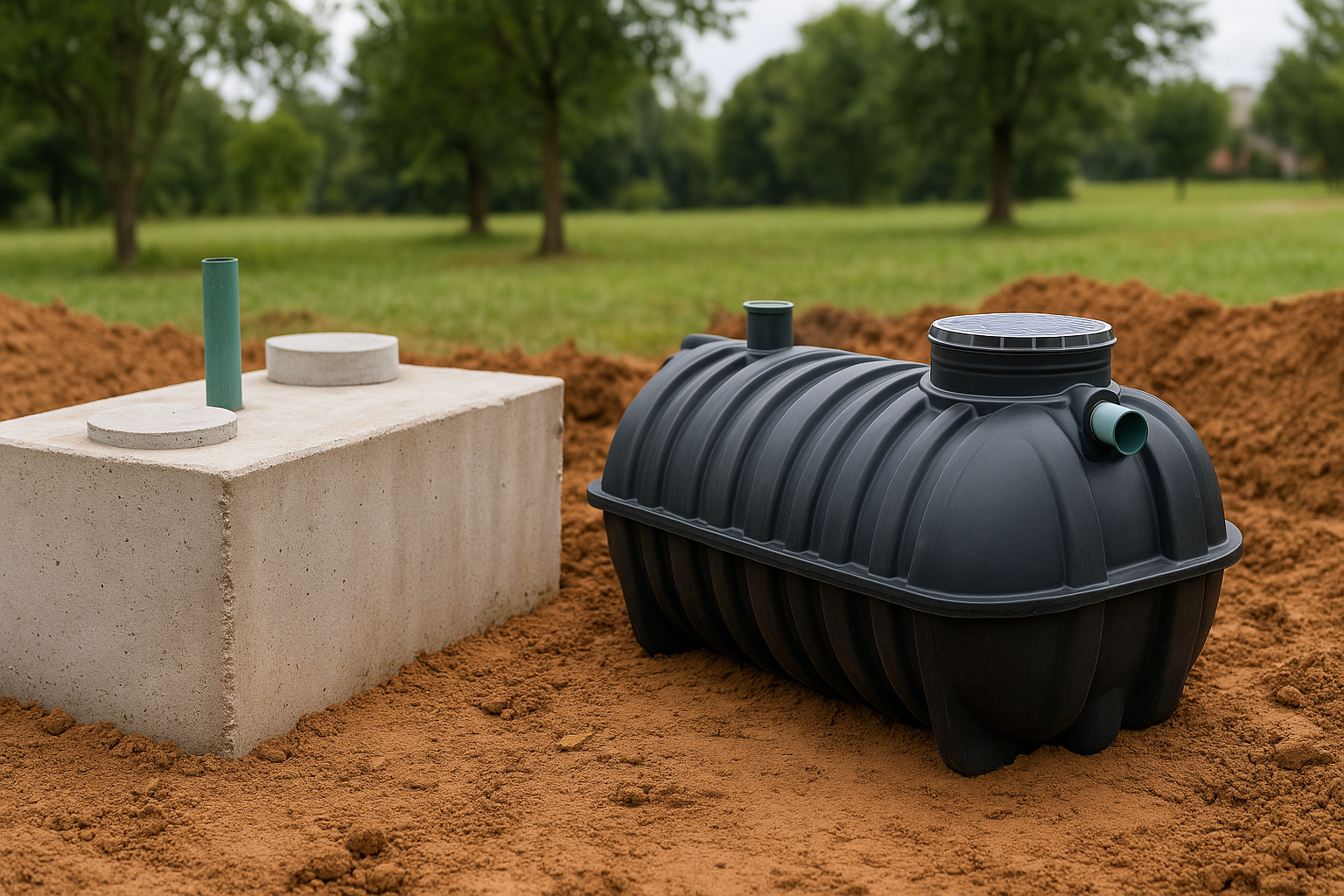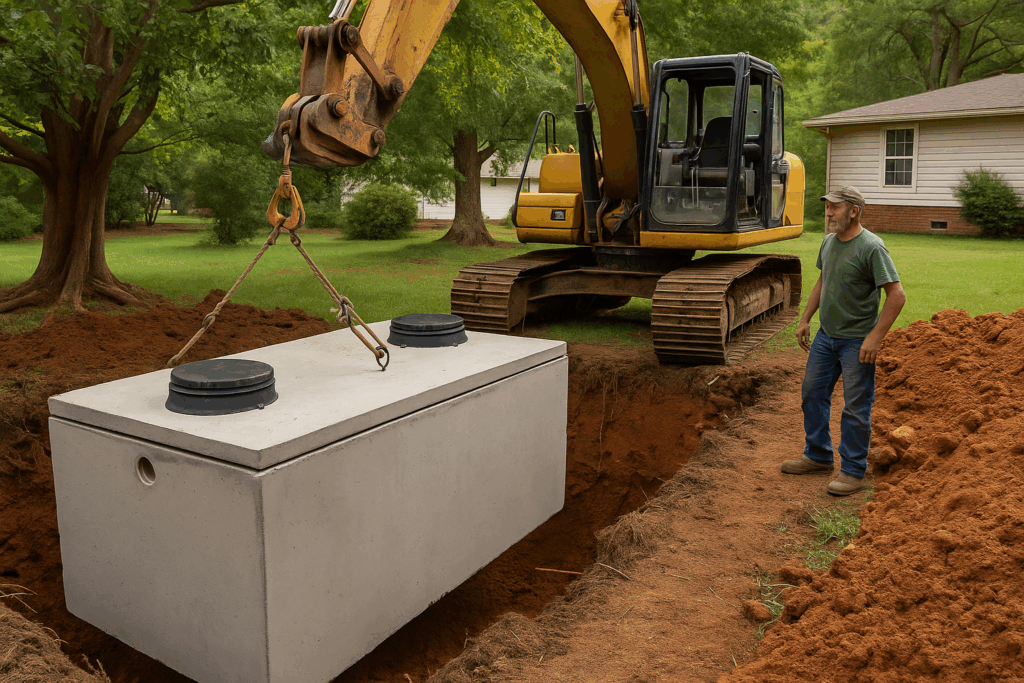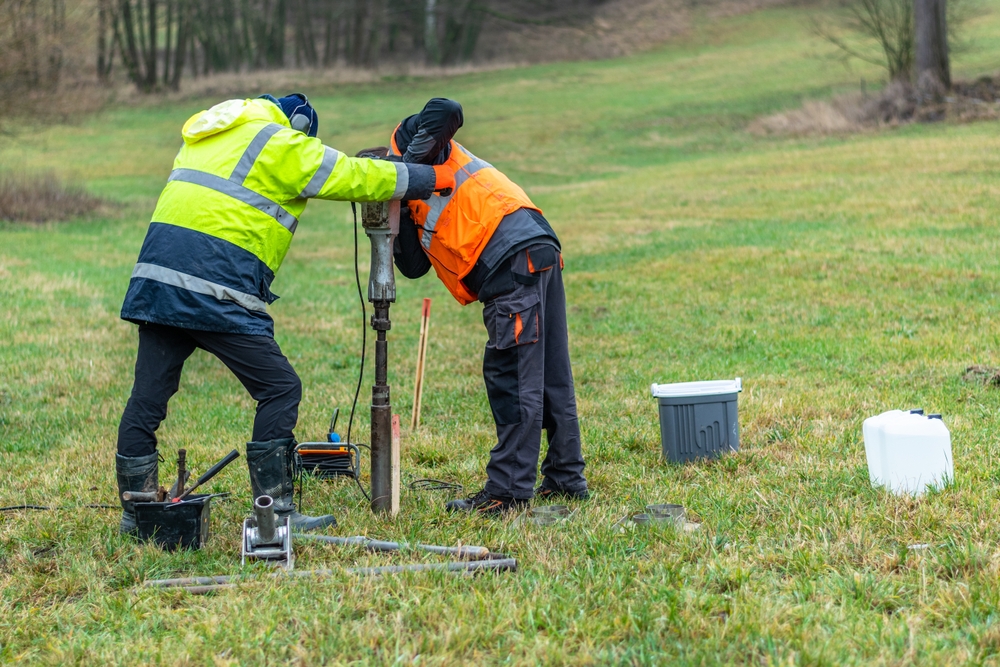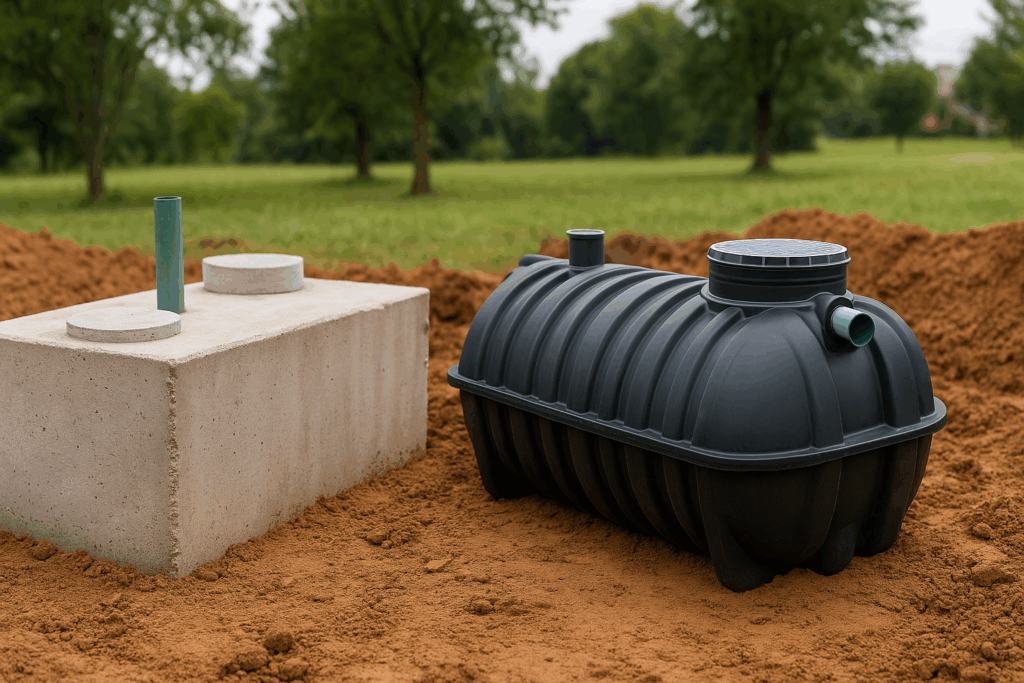Choosing the right septic tank is one of the most important decisions a homeowner in Upstate South Carolina can make. With hundreds of properties in Easley, Greenville, and Pickens County depending on septic systems, the choice between a concrete septic tank and a plastic septic tank can significantly affect your system’s durability, maintenance costs, and overall performance. Each material comes with advantages and disadvantages, and knowing which is best for your home depends on soil type, budget, and long-term needs.
Why Tank Material Matters for Upstate SC Homes
The tank serves as the foundation of your onsite wastewater treatment system. If it fails, the entire septic system can collapse, leading to costly repairs or full replacement. In areas like Upstate SC, where clay-heavy soils and fluctuating water tables create challenges, the tank material directly impacts:
- Structural strength under pressure.
- Resistance to groundwater intrusion.
- Lifespan and maintenance frequency.
- Ease of installation in rural or suburban settings.
Understanding how concrete and plastic septic tanks compare is the first step in making a smart investment.
Concrete Septic Tanks: Pros and Cons
Advantages of Concrete Septic Tanks
- Durability and Strength – Concrete is naturally resistant to crushing and works well in areas with heavy soil loads.
- Longevity – When properly maintained, concrete tanks often last 40 years or more.
- DHEC Compliance – South Carolina DHEC often prefers concrete tanks for their structural reliability.
- Large Capacity Options – Ideal for bigger households or commercial properties in Upstate SC.
Disadvantages of Concrete Septic Tanks
- Heavier Installation – Requires heavy equipment for delivery and placement.
- Cracking Risk – Over time, poorly made or installed tanks may crack, allowing leaks.
- Higher Upfront Cost – Typically more expensive than plastic tanks.
- Difficult Repairs – Cracks or leaks often require professional patching or full replacement.
Concrete tanks are the most traditional choice in South Carolina and remain popular for their proven track record.
Plastic Septic Tanks: Pros and Cons
Advantages of Plastic Septic Tanks
- Lightweight and Easy to Install – Contractors can install plastic tanks quickly, often without large machinery.
- Lower Initial Cost – Generally less expensive than concrete options.
- Corrosion Resistant – Plastic won’t rust or corrode, even in acidic soils.
- Watertight Construction – Manufactured as single-mold units, reducing leakage risk.
Disadvantages of Plastic Septic Tanks
- Lower Structural Strength – Can shift or deform in high groundwater or under heavy soil.
- Smaller Capacity – Not always suitable for large households.
- Susceptible to Damage – Roots, rocks, or even minor impacts can compromise the structure.
- Regulatory Restrictions – Some local DHEC inspectors may limit or disapprove their use in certain soil conditions.
Plastic tanks are best suited for smaller homes in areas with good soil drainage and low vehicle traffic.
Key Differences Between Concrete and Plastic Septic Tanks
| Feature | Concrete Septic Tank | Plastic Septic Tank |
|---|---|---|
| Durability | Extremely strong, lasts decades | Less durable, prone to shifting |
| Installation | Requires heavy equipment | Lightweight, easier installation |
| Cost | Higher upfront, lower long-term repair risk | Lower upfront, higher long-term maintenance |
| Lifespan | 40+ years with proper care | 20–30 years on average |
| Regulatory Approval | Widely accepted by DHEC | Sometimes restricted by soil conditions |
Which Tank Works Best in Upstate South Carolina?
Local conditions in Easley, Greenville, and Pickens County play a huge role in determining the best option:
- Clay-heavy soils – Concrete performs better under heavy soil pressure.
- High water tables – Plastic tanks may float or shift, making concrete a safer bet.
- Budget-conscious homeowners – Plastic tanks offer a lower upfront investment.
- Large households – Concrete tanks provide larger capacity and longer lifespan.
For most Upstate SC homeowners, concrete septic tanks remain the preferred choice because of their durability and compliance with South Carolina DHEC requirements. However, plastic tanks can be a cost-effective solution for smaller properties with favorable soil conditions.
Professional Guidance Is Essential
Because each property is unique, choosing between concrete vs. plastic septic tanks requires professional evaluation. Licensed septic contractors in Upstate SC can:
- Perform soil and site evaluations.
- Recommend tank size and material based on household needs.
- Ensure compliance with DHEC permitting rules.
- Handle installation, pumping, and long-term maintenance.
Make the Right Choice for Your Septic System
For homeowners in Upstate South Carolina, the choice between concrete and plastic septic tanks can have lasting effects on performance, maintenance, and costs. While concrete tanks often win for durability and regulatory approval, plastic tanks may suit smaller households with limited budgets.
To explore your options and connect with licensed professionals in Easley, Greenville, and Pickens County, visit Easley SC Septic. Our directory connects homeowners with trusted septic experts who can help evaluate your property and recommend the best solution.
#concreteseptictank #plasticseptictank #septicsystems #easleysc #upstatesc





